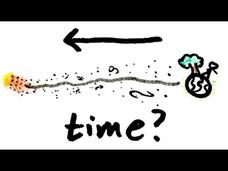Lesson Planet Curated
Anatomy - PreK - 1st Grade
Anatomy starts at the microscopic level with cells, which are the basic units of living things. Cells combine to make tissues, tissues combine to make organs, and organs combine to make organ systems.
Lesson Planet Curated
Tools for Supporting Emotional Well-Being: Youth and Teens
The “Tools for Supporting Emotional Well-Being: Youth and Teens” collection is comprised of six videos that provide young people with techniques they can use to help them cope with anxiety and stress. The comic book-style videos are...
Lesson Planet Curated
Solar Updraft Towers
Get young scientists energized about all the different energy sources with a five-lesson unit that combines research, direct observations, and hands-on investigation. To begin, scholars investigate a renewable or non-renewable energy...
Lesson Planet Curated
A Community Powered by Renewable Energy
Renewable energy is the focus of a seven-part environmental science unit for middle and high schoolers. Lessons challenge students to look closely at the type of energy they consume in their home, examine the regulations and limitations...
Lesson Planet Curated
Bioreactor Water Heating
Three hands-on STEM renewable energy activities lead learners through the concepts of solar and biomass heating and water pumping to design a water pumping system that uses multiple technologies to avoid water freezing in winter. They...
Lesson Planet Curated
TeachEngineering: Photovoltaic Efficiency
Many factors affect the power output of photovoltaic (PV) solar panels. Four lessons and activities provide young engineers with the background information they need to design, build, and test photovoltaic systems.
Lesson Planet Curated
TeachEngineering: Using Nanoparticles to Detect, Treat and Protect from Skin Cancer
Young scientists take on the role of biomedical engineers as they accept the challenge of using nanoparticles to help detect, treat, and protect people from skin cancer. Researchers perform hands-on activities to become familiar with the...
Lesson Planet Curated
Crash Course: Chemistry
Loosely based on the 2012 AP Chemistry curriculum, a series of 46 videos introduces high schoolers to organic chemistry. The videos model how to reason through problems, recognize different organic chemicals, their uses, and use the...
Lesson Planet Curated
Flipping Physics: AP Physics 1 Review
Flip the review of key concepts in Physics 1 with a series of videos designed to help viewers prepare for the AP exam. Topics covered include Kinematics, Dynamics (Newton’s 3 laws and friction); Work, Energy and Power; Linear Momentum...
Lesson Planet Curated
MinutePhysics: The Big Picture (Time & Entropy, feat. Sean Carroll)
Talk about essential questions! The five videos in the Minute Physics collection look at the big picture and tackles some big questions: Why Doesn’t Time Flow Backwards? Do Cause and Effect Really Exist? Where Does Complexity Come From?...
Lesson Planet Curated
Solar vs. Wind Energy
Power up! A series of six lessons introduce middle schoolers to the different types of energy. PowerPoints, activities, and hands-on experiments teach young electrical engineers the difference between energy and power, as well as the...
Lesson Planet Curated
Multimedia Discovery Missions
The Multimedia Discovery Missions collection is a series of 13 interactive presentations and activities that introduce young geologists and oceanographers to fundamental concepts involving the Earth’s crust and ocean sea life. Benthos,...
Lesson Planet Curated
Life Science
Photosynthesis, extinction, biomimicry, and bioremediation. Young environmental engineers study these processes. Using photosynthesis as a model and biomimicry as an example, groups research how nature provides hints for engineering...
Lesson Planet Curated
Up, Up and Away! - Airplanes
Oh, if only Sir Isaac and Bernoulli could see us now. Even Orville and Wilbur would be amazed by what engineers have designed using their ideas. Next generation engineers put these principles to use as they use what they learn about...
Lesson Planet Curated
Life Science: Ecosystems and the Flow of Energy
Different ecosystems thrive in various places, with a variety of habitats, including specific plants and animals that have adapted to survive in those specific conditions. But they all have one thing in common: all of the energy that...
Lesson Planet Curated
What is Life?
A Nature League series of five videos, hosted by Brit Garner of the SciShow, make up a collection that models how scientists conduct investigations. The first video addresses the definition of life, it's characteristics, and the...
Lesson Planet Curated
Climate Change in My Backyard: Grades 7-9, Unit 1
Engage young scientists in a study of climate change with a collections of lessons that combine online research with labs, videos, activities, nature walks, and a NASA data analysis tool to examine different Earth's systems and how they...
Lesson Planet Curated
Global Atmospheric Change
This is an extensive set of 12 lessons investigating the earth's atmosphere, energy, and the carbon cycle. Intended for upper-elementary age students, you'll find everything you need here including teacher notes, handouts, slide...
Lesson Planet Curated
Space Science: The Sun and Its Influence on Earth
These videos by Crash Course Kids are an excellent way to get your class pumped up about the solar system. From rotations and revolutions to the gas giants and rocky planets, everything (and more) about the solar system is covered in...


















